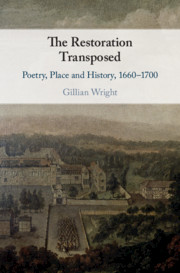Book contents
- The Restoration Transposed
- The Restoration Transposed
- Copyright page
- Dedication
- Contents
- Acknowledgements
- Textual Conventions
- Abbreviations
- Introduction
- Chapter 1 The Spenser Problem
- Chapter 2 Poetry and Restoration Ireland
- Chapter 3 Poetical Plants and Leafy Landscapes
- Conclusion Transposing the Restoration
- Selected Bibliography
- Index
Chapter 1 - The Spenser Problem
Published online by Cambridge University Press: 21 September 2019
- The Restoration Transposed
- The Restoration Transposed
- Copyright page
- Dedication
- Contents
- Acknowledgements
- Textual Conventions
- Abbreviations
- Introduction
- Chapter 1 The Spenser Problem
- Chapter 2 Poetry and Restoration Ireland
- Chapter 3 Poetical Plants and Leafy Landscapes
- Conclusion Transposing the Restoration
- Selected Bibliography
- Index
Summary
‘The Spenser Problem’ considers how writers and critics of the Restoration read, responded to and evaluated the works of Edmund Spenser, especially The Faerie Queene. Spenser, who had died in 1599, was regarded by many in this period as among the most important poets in English literary history, the only Englishman worthy of comparison with canonical European poets such as Homer and Virgil. Yet he was also frequently disparaged by Restoration critics on grounds of his archaic language and his unfashionable style (both his use of allegory and his supposedly unwieldy stanzaic form). ‘The Spenser Problem’ surveys critical responses to Spenser by both well- and little-known writers, the former including such poets as Cowley, Milton, Oldham, Behn and Dryden. It also focuses on Jonathan Edwin’s 1679 edition of Spenser’s Works – the first new collected Spenser since the 1610s – arguing for its importance both within the history of Spenser reception and within larger narratives of English literary history. Crucial in establishing Spenser’s canon and reworking his reputation in the light of Restoration norms and preoccupations, Works (1679) also pioneered the republication of English poetry of ‘the last age’ in a manner later taken up by booksellers such as Jacob Tonson.
- Type
- Chapter
- Information
- The Restoration TransposedPoetry, Place and History, 1660–1700, pp. 8 - 71Publisher: Cambridge University PressPrint publication year: 2019

